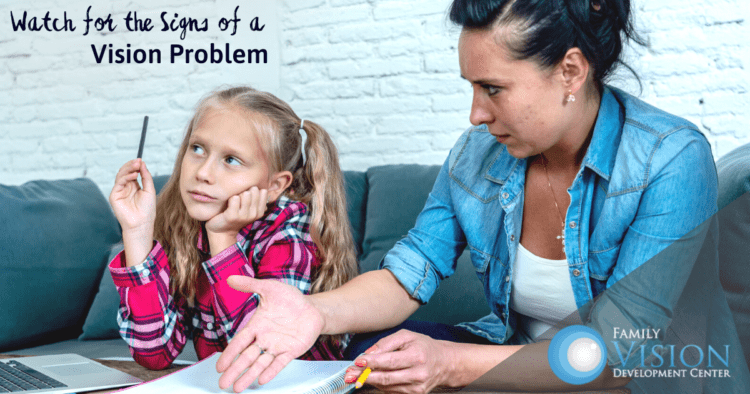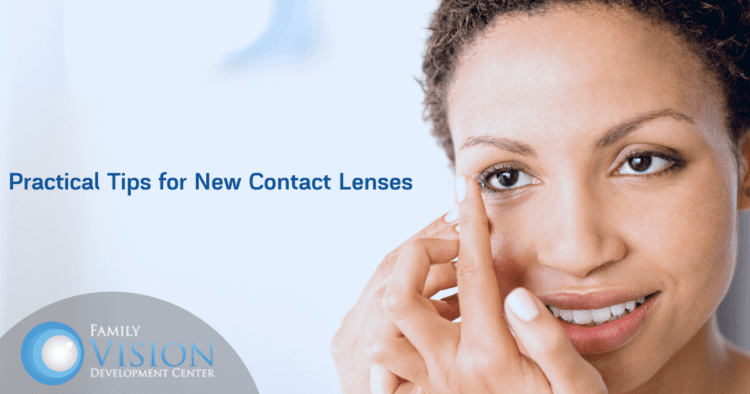Vision therapy, which is also known as vision training or visual training, is an individualized treatment program that is like physical therapy for the eyes and brain. Through customized eye exercises, patients can develop or recover normal visual skills that may have been impaired due to a wide range of vision disorders.
While individuals of all ages can benefit from vision therapy, it can be especially helpful for young children with learning disabilities or those suffering from lazy eye, crossed eyes or focusing issues. Vision deficits can cause eyestrain, blurred or double vision, and headaches that make it difficult to stay focused while reading, maintaining attention in the classroom or focusing on close work. Vision therapy can help correct these visual deficits. With vision therapy, children are better positioned to achieve their full potential, both in and out of the classroom.
Could your child benefit from vision therapy? These common signs can indicate that there is an underlying vision problem.
- Your child has poor hand-eye coordination, which may be evident in poor handwriting, motor coordination, athletic performance, etc.
- Your child has problems walking or running, and frequently drops objects or bumps into things
- Your child holds a book or object unusually close
- Your child closes one eye or covers the eye with his/her hand
- Your child omits or confuses small words when reading
- Your child reverses words when reading (e.g., “no” for “on”) or transposes numbers (e.g., “21” for “12”)
- Your child complains frequently of headaches, eyestrain, nausea, dizziness and/or motion sickness
- Your child frequently avoids or objects to doing homework
- Your child exhibits behavior problems in school
Regular eye exams can detect vision problems that standard screenings do not
Even though your child may receive vision screenings at school, these tests do not diagnose the many vision conditions that a comprehensive eye exam does. It is important to be diligent when it comes to your child’s vision – especially if you notice any of the above signs of a problem. Vision therapy can be an excellent form of treatment, and a successful outcome is even greater when issues are diagnosed early on. At Family Vision Development Center, vision therapy is our specialty. Dr. Martin is specially trained to treat a variety of vision related conditions using complete vision therapy services designed to restore and improve visual efficiency. Contact us today at 630-862-2020 or visit us online to schedule your appointment.
Contacts are a smart choice for individuals who are active and dislike the feeling of wearing glasses. However, the process of caring for and getting used to new contacts can take a week or two. Navigate the transition with ease by learning how to properly care for contacts and becoming familiar with common symptoms that occur when you first wear them.
What to Expect When First Wearing Contacts
As with any new eye prescription, it may take a few days for your eyes and brain to adjust to the changes. New prescriptions may cause mild headaches or slight dizziness. If this persists after the first week, it may be a sign that your prescription needs to be adjusted.
New contacts can also sometimes cause mild eye irritation during the first few days of use as you get used to the new sensation. You may feel uncomfortable that there is something in your eye or notice when your lenses begin to dry out. After a day or two, these symptoms typically go away. Remember that these minor issues are normal, and all a part of getting used to something new. However, if you continue to experience eye irritation after a week, or have any concerns at all, contact us for recommendations.
Practice, Practice, Practice!
Getting comfortable putting in your new contacts can take some time. It can be a strange feeling touching your eye like that and you may wonder if you are doing it correctly. We will give you specific instructions during your appointment, but the more you practice, the easier it will become. Soon it will become a very natural part of your daily routine.
Caring for Your New Contacts
One of the most common causes of eye irritation is improper care for contact lenses. There are certain things you should always remember when caring for your new contacts:
- Always wash your hands before and after touching your eyes to avoid spreading bacteria. Also, be certain that all soap residue is thoroughly rinsed before touching the lenses.
- Remember that tap water is not appropriate to clean your contact lenses. Only use the contact lens solution provided by your eye doctor to avoid damaging the lenses and to ensure they are disinfected properly.
- Storing your new contacts properly is another very important task. Always use fresh solution to store your contacts overnight. Reusing contact solution may cause eye irritation or infection.
Proper Follow-Up Care
Remember that caring for your new contacts also includes getting regular eye exams to make sure that problems do not go undetected. Serious infections can occur if lenses are not cared for properly, so visiting us on a regular basis can help ensure proper use and address any prescription issues. Contact us at 630-862-2020 to make your appointment for your new contacts this year! We have a wide variety of choices available in the latest lens technology, and can find the right lenses for your specific lifestyle.



